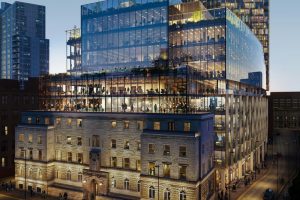Property Interview: Fast-growth TMT sector looks to the North for growth, says LSH director

BY 2020, one Northern job in every 11 will be in the creative and technology, media and telecommunications (TMT) industry according to research by the Centre for Economics and Business Research which leads to the question, where are we going to put all these businesses?
In Leeds, take-up from TMT companies represented 28% of occupier deals this year and property consultancy Lambert Smith Hampton (LSH) says it has seen a marked rise in the number of TMT businesses moving into Northern cities.
LSH director Adam Varley said it was clear when looking at take-up that increased demand for TMT-focused property would need to be filled – and the question remained whether cities such as Leeds and York can meet the growing sector’s needs.
“[The TMT sector] is starting to take a foothold in Leeds and the whole Northern Powerhouse network, from Manchester to Liverpool, Newcastle and Sheffield,” he said. “It’s a combination of what has been a relatively difficult occupational market and that the TMT sector has been doing increasingly well compared to others – corporate activity has been fairly limited, which does also distort things slightly.”
Well-known brands such as Sky, Sky Betting and Gaming and Google taking up space in the region has acted as a catalyst for other related businesses to set up shop but this is a “double-edged sword”, says Mr Varley.
“When Sky moved in for example, they seemed to absorb web designers and as a result, a bigger gap in the market of available skills for new entrants appeared.”
He said that new, highly skilled graduates are looking for something different than the traditional London route and that TMT businesses themselves are looking at alternative locations which are more attractive to their employment base.
“A lot of these are young businesses with a more mobile employment base which is not too fussed about where their base would be, more agile, mobile workforce.”
“Places like Leeds offer something totally different,” he said. “Leisure, great amenities, access to the countryside – though I may be biased being a Yorkshireman!”
This move towards the North has been part of the government’s agenda as well as the business agenda, and the Northern Powerhouse concept has been advantageous the the regions.
Mr Varley said: “It works as a catalyst and to reassure businesses there is commitment to large scale infrastructure up here.
“There is also pressure to rebalance the UK economy away from the South, when you look at costs, which a large proportion of these businesses are, it is forcing them to rethink London, because it has become too expensive for them.
“Leeds is better placed than any other city [to attract TMT businesses]. Specialisms like healthcare and fintech have come out of it. We’re expecting a large number of meditech businesses to consider Leeds because of the data sources available here.”
But the growth of TMT in the region does not mean that more traditional commercial space will be filled up with ping pong tables and beanbags.
“There is room for both corporate and TMT businesses in the region,” he said. “Corporate requires a different type of building and in Leeds this is concentrated in the west end of the city with developments like MEPC’s Wellington Place and 6 Queen Street. These areas capture the interest of the corporate world better.
“TMT businesses don’t normally fit into same category of locations, they push back on traditional corporate structure looking at space in the South Bank, The Calls, and Holbeck Urban Village – different types of space than a standard corporate would take.”
The bottom line is that the TMT sector relies on technology rather than postcode, so expect to see more move in as talent from Leeds’ universities, lower costs and a better quality of life attract these entrepreneurial businesses.








